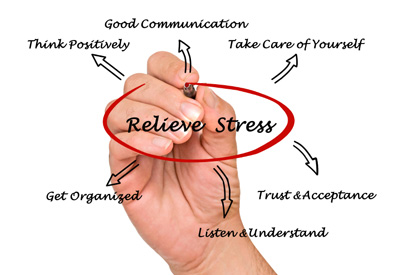
Stressing the Positive
Stress has a bad rap. While there’s much truth to the saying “stress kills,” stress sometimes saves us because it kicks in when we face mortal danger. It’s our early warning system.
While too much stress is bad for our health, we may need a balance. Stress expert Donald Tubesing compares it to a spice: “In the right proportion it enhances the flavor of a dish. Too little produces a bland, dull meal; too much may choke you.”
The American Psychological Association defines stress as “your body’s natural reaction to any kind of demand that disrupts life as usual.” Those demands can be good or bad. Good stress revs us up and equips us to face challenges. Think of traveling to a new place, competing in sports or striving for a goal.
Bad stress depletes us. It may be related to real life events – death, divorce, health crises and financial troubles; or may be a result of internal triggers, such as fears or unrealistic expectations we impose on ourselves. No matter the cause, research shows that too much bad stress over too long a period can contribute to life threatening conditions such as heart disease, high blood pressure and diabetes.
Experts say that it is not whether we have stress but how we perceive it and the ways that we try to manage it. The poet Robert Louis Stevenson said, “Life is not a matter of holding good cards, but of playing a poor hand well.” In managing stress, many people are their own worst enemies. They light a cigarette, pour some drinks, overindulge in

“comfort” foods and engage in other ineffective escape activities like focusing on the negative rather than the positive, which often add stress upon stress and take a further toll on health.
To effectively manage stress, we need to learn what triggered the stress. It can help to jot down notes to see if there are any patterns. Once the sources are identified, you can begin changing that which can be changed and learning coping skills to deal more effectively with that which can’t be changed.
We can learn techniques to prevent stress from building, such as by planning ahead to prevent time crunches, getting comfortable with saying “no,” realigning priorities and learning to manage the limitations of time or money. There’s also a deep toolbox of ways to relieve stress: exercise, meditation, healthy eating, laughter, walks in nature, helping someone else, spending time with friends or pets, developing hobbies and learning to “unplug” from the pervasive demands of phones and e-mail.
Sometimes we can recalibrate on our own and effectively manage the stress in our lives, but sometimes it helps to have an objective party to guide us through the rough spots. Your EAP Counselor can help you learn to better manage stress – why not give a call?
1.800.252.4555 or 1.800.225.2527
View more newsletters at www.theEAP.com
